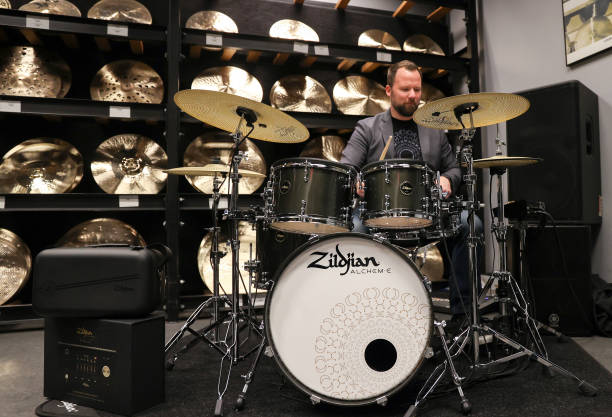Rhythm is the foundation of all music, and no musician understands it better than a drummer. Drummers are responsible for maintaining the tempo, creating groove, and driving the energy of a performance. Their ability to stay locked into a beat while synchronizing with other musicians showcases their superior sense of rhythm. But what makes drummers so rhythmically gifted? This article explores the reasons on Why Drummers Have the Best Sense of Rhythm, their training methods, and how their skills impact the world of music.

Understanding Rhythm: Why It Matters in Music
Rhythm is more than just playing in time; it is the essence of musical flow. A strong rhythmic foundation allows musicians to create expressive and dynamic performances. Drummers are trained to internalize rhythm deeply, making them the backbone of any band or ensemble. Their ability to maintain a steady pulse while adding complex patterns and fills is what makes them stand out.
The Science Behind Drummers’ Superior Rhythm
1. Brain Development and Coordination
Studies have shown that drumming enhances brain function. Drummers engage both hemispheres of their brain simultaneously, improving coordination, memory, and cognitive skills. The act of keeping a steady beat while executing intricate drum patterns strengthens neural connections, making drummers more adept at multitasking and processing complex rhythms.
2. Advanced Motor Skills and Limb Independence
Drummers develop advanced motor skills by training their hands and feet to operate independently. Unlike other musicians who primarily use their hands, drummers must coordinate multiple limbs in real time. This limb independence strengthens their internal sense of timing and helps them maintain a precise beat.
3. Subdividing Time Accurately
Drummers train extensively in subdividing beats into smaller rhythmic units. Whether it’s eighth notes, triplets, or sixteenth notes, drummers develop a keen ability to dissect time and play rhythms accurately. This precise timekeeping ability is what allows drummers to control the pace of a song effortlessly.
4. Enhanced Listening Skills
Drummers are constantly listening to other musicians to stay in sync. Their heightened auditory perception helps them detect small timing variations and adjust accordingly. This acute sense of listening enables drummers to play tightly with a band, reinforcing the overall groove.
How Drummers Train Their Rhythm
Drummers spend years refining their rhythm through structured practice. Here are some of the techniques they use:
1. Metronome Training
Practicing with a metronome is one of the most effective ways for drummers to develop impeccable timing. They start with slow tempos and gradually increase speed while ensuring precision. This builds their ability to play consistently, even in fast and complex drum patterns.
2. Playing Along to Music
Drummers improve their sense of groove by playing along with recorded tracks. This helps them develop the ability to lock into a rhythm while adapting to different musical styles and tempos.
3. Polyrhythm and Odd Time Signature Practice
Many drummers challenge themselves by practicing polyrhythms (simultaneous contrasting rhythms) and odd time signatures (such as 5/4 or 7/8). Mastering these complex patterns strengthens their internal timekeeping skills and broadens their rhythmic vocabulary.
4. Hand and Foot Exercises
Drummers practice rudiments and footwork drills to build dexterity and control. Exercises such as paradiddles, flams, and double-stroke rolls help them execute intricate rhythms with ease.
5. Internalizing Rhythm Through Body Movement
Many drummers develop their rhythm by incorporating body movements such as tapping, clapping, or even dancing to a beat. This helps reinforce rhythm internally, making it second nature.
The Impact of Drummers’ Rhythm on Music and Performance
1. Driving the Groove
Drummers are responsible for setting the groove and keeping the music flowing. A great drummer can make a song feel tighter, more dynamic, and engaging. Their ability to control tempo and feel dictates how a band sounds overall.
2. Improvisation and Creativity
Drummers often add creative fills, accents, and rhythmic variations to enhance a song’s character. Their ability to improvise on the fly adds excitement and uniqueness to live performances.
3. Supporting Other Musicians
Drummers act as the anchor for other musicians. Bassists, guitarists, and vocalists rely on the drummer’s steady pulse to maintain cohesion in a song. Without a solid drummer, even the most talented musicians can struggle to stay in sync.
4. Adapting to Different Musical Styles
Drummers with a strong sense of rhythm can seamlessly transition between different genres, whether it’s rock, jazz, funk, or metal. Their ability to adjust their playing to suit the style of music makes them invaluable members of any band.
FAQs About Drummers and Rhythm
1. Do drummers naturally have better rhythm than other musicians?
While drummers train extensively in rhythm, anyone can develop strong timing with practice. However, because drummers focus on rhythm from the beginning, they tend to have a more refined sense of timing compared to other musicians.
2. Can drumming improve a musician’s rhythm in other instruments?
Yes! Many guitarists, pianists, and vocalists practice drumming techniques to strengthen their rhythmic skills. Drumming enhances timing, coordination, and musical awareness, which benefits any instrument.
3. How can someone improve their rhythm like a drummer?
Practicing with a metronome, clapping along to beats, playing percussion instruments, and developing a habit of active listening to rhythms in music can help improve rhythm like a drummer.
4. Are drummers better at dancing or moving to music?
Since drummers have a strong internal sense of rhythm, they often find it easier to move to music and dance in sync with a beat. Many drummers naturally develop a good sense of movement and groove.
Drummers possess an exceptional sense of rhythm due to their specialized training, advanced coordination, and deep internalization of timing. Their ability to maintain a steady pulse while executing intricate patterns makes them the backbone of any musical performance. By practicing with metronomes, playing along to music, and mastering complex rhythmic patterns, drummers refine their sense of time like no other musicians.
Beyond their technical skills, drummers play a crucial role in shaping the groove and feel of music. Their influence extends beyond percussion, impacting other musicians and even non-musical aspects of life, such as coordination and multitasking. Whether on stage or in the studio, drummers set the foundation for unforgettable musical experiences, proving why they truly have the best sense of rhythm.
